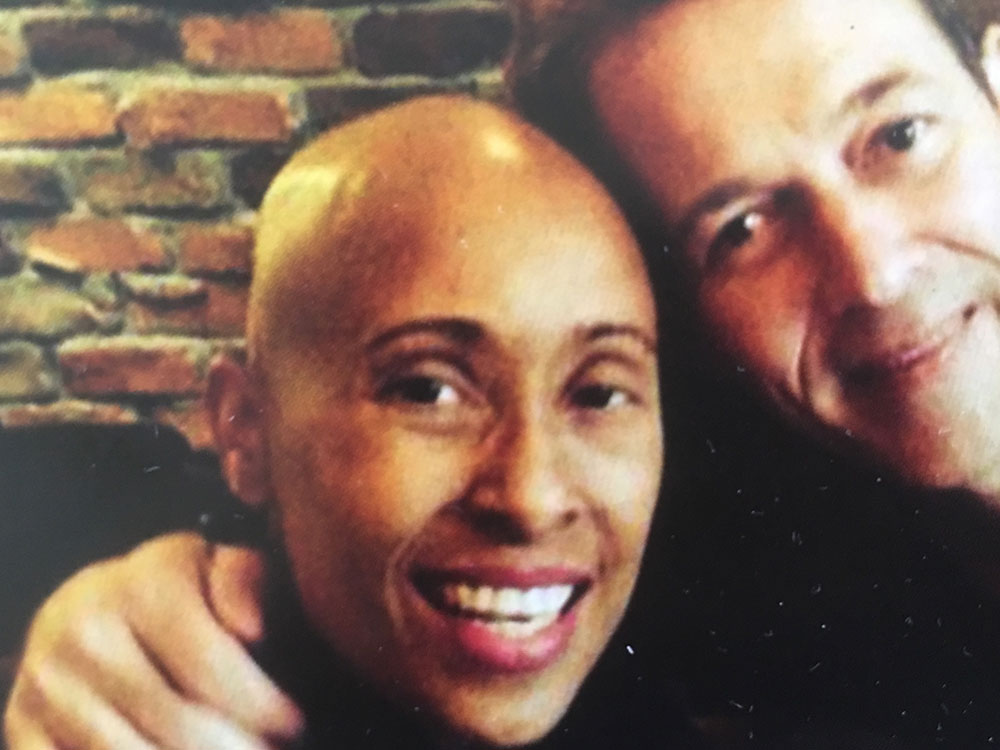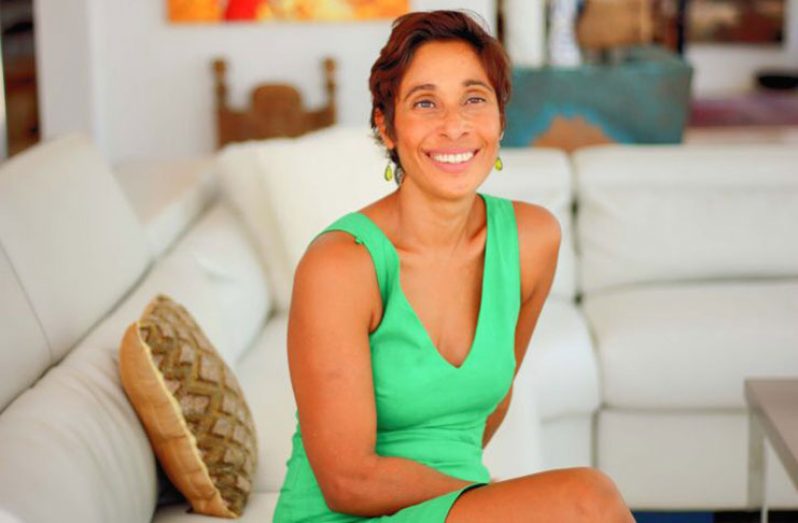A breast cancer survivor’s story
By Gibron Rahim
WE may not often consider the words ‘survival’ and ‘fight’ or what they mean to each of us. Yet, even as we commemorate Breast Cancer Awareness Month, there are women among us who have had those words foremost in their minds as they battled breast cancer. The stories of these survivors are valuable. They deserve to be told. Anjuli Beharry-Strand is one of these survivors.
In January 2013, after given birth to her daughter that past September, Anjuli noticed severe but occasional itching in her left breast. She used Benadryl and it worked on what appeared to be a simple allergy at the time. That February, she went up to New York and underwent a mammogram. The mammogram was clear. Then, that August, she felt a lump at the top of her left breast. It felt like a small and hard pea.

Anjuli was told that the lump was benign and to keep monitoring it but a doctor in Guyana told her to go and get it looked after. So, in September 2013, she visited her gynaecologist who performed a mammogram and a sonogram. Those results led to a biopsy being ordered right away. She would have the results in 24 hours.
She was with her cousins when she got the call. It was confirmed – she had triple negative, very aggressive breast cancer in the duct. “Nothing in this world could prepare you for hearing that,” Anjuli told the Pepperpot Magazine. She described it as the most terrifying moment of her life. Not only was her breast cancer the most aggressive form of the disease, it was also one that the least amount of research had been conducted on due to its rarity. Triple negative breast cancer does not respond to hormonal therapies – chemotherapy was the only way.
She had been having drinks with her cousins but Anjuli begged them to take her home. “I heard nothing,” she said. “The world didn’t exist.” All she kept hearing in her head was that she was going to die. Her husband was back in Guyana with their children. It would take him two days to get there due to problems arranging a flight. Though she was terrified, she tried to stay strong for her children.
When her husband arrived the next day, she broke down. “I think I cried for hours,” she said. After she had done all her crying she decided it was time for her to fight. She had to live for her children. She made an appointment with a breast surgeon. After checking her, the surgeon ordered a procedure that allowed her lymph nodes to be mapped. “She told me she thought I was going to be okay because it was in the duct and it hadn’t spread anywhere else,” Anjuli related.
TOUGH DECISION
Anjuli then had a decision to make. The surgeon asked her if she wanted a lumpectomy to remove the lump or a mastectomy to remove the entire breast. She decided to undergo a double mastectomy to remove both breasts. After the seven-hour procedure, she woke up feeling really sick but happy. Anjuli returned to Guyana for a few weeks to recover. At that point, she could not lift her arms above her head. “I lost all feeling from my arms, my back and my chest,” she said. “I don’t have any feeling today as well. I’m completely numb.”
The fight was not yet over. Anjuli returned to New York after the few weeks had passed for chemotherapy.
She underwent four months of chemotherapy. She said that 24 hours after chemotherapy she had to inject herself with Neulasta. The drug forces the body to produce white blood cells which causes a tremendous amount of pain. “I would have pain from the top of my head to the bottom of my toes.” Though it was a difficult process, she maintained a good frame of mind. She had her daughter to take care of. She laughed through it. She took her daughter to the playground. She cooked. She continued to do everything as normal, even as she was losing her hair, eyebrows and eyelashes. She returned home after her chemotherapy was complete, feeling elated.
ADJUSTING
When she had started to lose her hair, Anjuli admitted to wondering how her husband would view her when he saw her without hair. She needed not to have worried. “He was wonderful,” she said. Indeed, so were her family, friends and co-workers. “I had such an amazing support system,” Anjuli declared. “It really made all the difference for me.”
The hardest part came when she went back for her breast construction in May 2014. After her reconstruction, she thought that she would look normal and feel normal again. It was devastating, she said, because that was not the way things went. “It was difficult because a lot of women relate their femininity to having breasts and I didn’t have breasts anymore.” She allowed herself time to heal and time to grieve the loss.
While she recalled that she gave talks to women at Davis Memorial Hospital and St. Joseph Mercy Hospital when she initially returned, Anjuli is not currently actively involved in advocacy or charities for breast cancer. A large part of this is related to the loss of her mother to leukaemia, not long after her breast cancer. However, other women have reached out to her and she has spoken to them privately and shared her story with them.
One of the concerns she has as it relates to awareness of breast cancer and other cancers is what comes after health talks and screenings. She said that so many women she has spoken to have told her that they have breast cancer but do not even know that there are different types. And different types that require different kinds of treatment at that. “That is something that we really need to focus on,” she said.
ATTITUDES TOWARD BREAST CANCER IN GUYANA
Anjuli also noted that we need to focus on how women are supported during the process of diagnosis and treatment of breast cancer. There is a stigma surrounding illness in Guyana. This was very telling in certain statements people made to her regarding her cancer. A colleague asked her if she believed in God and, when she affirmed that she did, she was told she should not speak about her cancer and should rely on God to heal her. She noted that there are people, not just in Guyana, but around the world who view illness as a punishment. “I feel that these things aren’t talked about,” she said. For this reason, it is important for her and other survivors to come forward with their stories.
There was no practice in Anjuli’s life that would have suggested she would have developed breast cancer. She has always eaten well. She has always exercised. She never binged on junk food. “Breast cancer is not something you get if you’re an unhealthy person,” she expressed. “I was the epitome of health and I got breast cancer.” No one else in her family has ever had breast cancer. Nevertheless, she says that women need to be diligent about their health. “Learn to love and know your breasts,” she said. “Check them every day.” And if they think something is wrong they should trust their instincts and seek help. “If you have to go to 10 doctors until you’re comfortable that nothing is wrong with you, do it.”
Breast cancer has undeniably changed Anjuli’s life. She has found that she is a kinder and more tolerant person now. And she wants other women to know that they are not alone. If she can just help one person she will be happy. There are many women who have similar stories. Anjuli noted that building a sense of community is important for women, especially if they receive the devastating news that they have cancer. Even survivors need support because the fear that breast cancer could return is real. Anjuli wants women who are currently living with breast cancer to know that there is light at the end of the tunnel. Support is available. They just need to reach out and ask for it. “This is a brief moment in your life. It feels like it’s forever and it feels unending but it will stop and you will get better,” she said.
A strong mind is an essential part of the fight. Anjuli said she had never understood the meaning of the word ‘fight’ when a friend told her she had to fight. “How do you even know what fight means?” she had asked. “And until I experienced it, now I know what it is. The fight is your mind. Your mind has to fight your body and say ‘I’m going to be alright. I have a reason to live. I have every reason to get up every single day.’”


.jpg)











